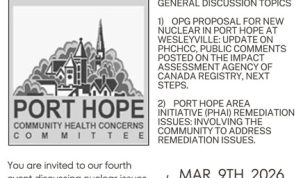The Canadian Nuclear Safety Commission (CNSC) announced today that Cameco Fuel Manufacturing (CFM) has been granted a 20-year renewal of its Fuel Facility Operating Licence. The CNSC’s Record of Decision will be available in the near future, and the news release is available here: Commission renews Cameco Fuel Manufacturing Inc.’s Class IB nuclear fuel facility licence for its facility for a 20-year period – Canada.ca.
The renewed licence allows CFM to operate until February 28, 2043, at which time CFM can request to renew the licence for another period. As part of this licence, CFM will participate in a comprehensive mid-point (10-year) review of its operational performance. This requirement is in addition to the regulatory oversight report meeting and compliance verification activities carried out annually.
“We are pleased with the Commission’s decision. The 20-year licence term reflects the strength and robustness of Canada’s regulatory framework and the strong safety and environmental performance of CFM’s operations,” said Dale Clark, vice-president of Cameco Fuel Services Division. “We are also grateful to the community and all the intervenors who showed their support for CFM. Safety remains at the core of who we are, and we will continue to operate safely and responsibly throughout the licence term.”
The licence renewal also grants CFM’s request for a slight production increase. This increase allows the facility to operate at 100% of its existing equipment capabilities. CFM does not expect to use this capacity in the near future and no changes to the facility are required. This increase in licenced capacity provides CFM additional capability to respond to rises in customer demand created by the global and Canadian transition to net zero.
CFM safely processes natural uranium dioxide powder into pressed pellets, which are then fitted into zirconium tubes and assembled into finished CANDU heavy water nuclear reactor fuel bundles. The 20-year licence provides CFM, its customers, and the people who rely on clean nuclear energy, with the regulatory certainty needed to enable the facility to safely provide this fuel for the next two decades.

























